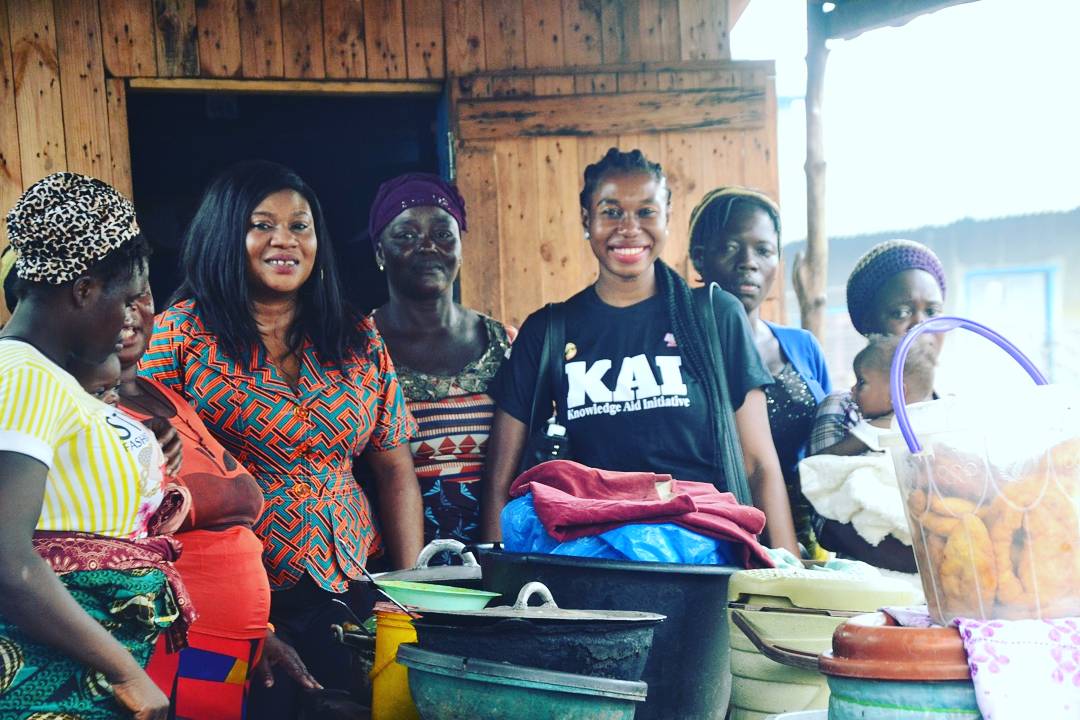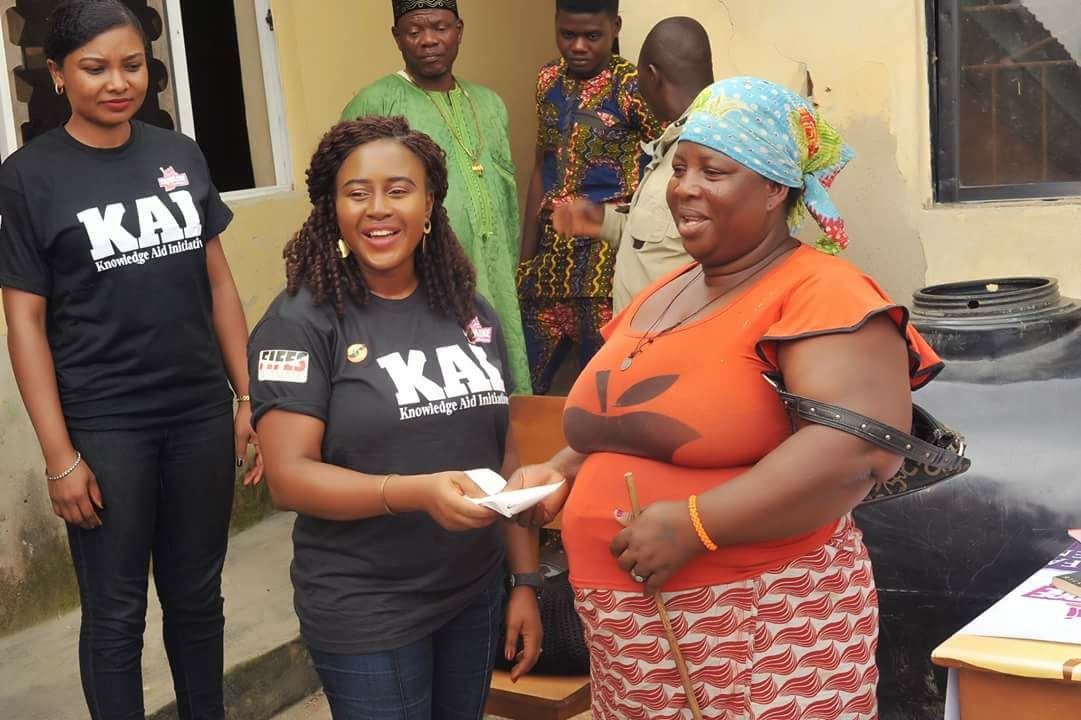
Since her university days, the Chief Executive Officer, Knowledge Aid Initiative (KAI), Success Ojo has consistently fought for the interest and social inclusion of the vulnerable people in remote communities. In an interview, she shares her experience over the years, talked about her organisation, the launching of the OneBariga Women Project of the organization and the Christmas Blessing Bag party with 1,000 Children in the slum of Ilaje Bariga, Lagos State, Nigeria.
Can you tell us about Knowledge Aid Initiative (KAI)

Knowledge Aid Initiative is a nongovernmental organization which is aimed at helping women and children in the slum to live a better life. We work with low income families to improve their standard of living to become productive members in their communities. We remain committed to improving the lives of people living in the marginalized communities. We are working to build a sustainable social change and improve the quality of life. KAI is committed to creating opportunities for Africa’s poorest, most vulnerable living in the remote communities while we partner with NGOs in Nigeria, we work with the Nigeria government, Donors, International Partners, Civil society Organizations and Community Based organizations to expand our impact to underprivileged communities.
We are passionate about social change, eradication of poverty and empowerment of the vulnerable through series of enlightenment and empowerment programs and integration of all amongst women, children and youths in the remote communities in all sector and at all levels.
Our vision is to achieve a peaceful world in which people most especially women, children and youths live free of poverty, abuse, discrimination and educational deficiency and lead the change.?

From my experience as a child psychologist, the family units play a crucial role in the society. If we have good products from the family, then we will have productive citizens. To have a developed country, we must support the family, so they can have active and productive citizens.
At what point or what experience led to you to embark on the project that seek to address the need of the rural poor in Nigeria
As a trained family and child developmental psychologist, the interest started during my research in the University. During the research, we undergo different studies in foster homes, rehabilitation centres and slums. It was there, I realised that the people living in the slums need a lot of support. I saw people living in horrible conditions.
This prompted me to start Knowledge Aid Initiative. Through this organization, we want to drive the attention of the world to the plight of women and children living in vulnerable communities in Nigeria.
We have over 100 slums in Lagos and the internal migration is increasing, why is this so and what should the government do to address this trend in the state?
It is a failure of the government to galvanize the potentials of the Nigeria people especially in rural communities. Although, people migrate for different reasons all over the world, but in Nigeria, many people leave their communities in search for greener pastures. In developed countries, there are slums: people who do not have what it takes to live in the city, move to the slums for survival. There should be a system put in place to check internal migration and bring people to an organized settlement.
But the major options available to government is to forcefully evict people living in hard reach communities because of some security reasons, is that the way to go?
You cannot drag or push your citizens away. You cannot say because the city is crowded, then you kill your citizens in order to decongest the city. When Government take away the slum dwellers’ accommodation and source of livelihood, then they have invariably kill them and robbed their children’s their rights and survival. Recently, I watched the forceful eviction that took place in Otodo Gbame one year ago, it was appalling and I was sad. Government is not supposed to take away their source of livelihood, without any form of proper resettlement.
These slum sites seem to pose serious threat to the environment sustainability in the state?

There are slums in the United States of America, but the US government has plan for them. Is it that the Lagos state government cannot provide good and inclusive resettlement programme for people within the cities? No matter where a child is born or the situation surrounding his or her birth: children are the same everywhere in the world and their needs and expectations are the same. The people living in the slums are not less humane, they only lack better amenities. My experience with these people is that they are hardworking but they lack support and that is why they are not progressing. Government should provide better support system for them to thrive.
You are launching OneBarigaWoman on the 18th, December, 2017; can you share with us what the project is all about?
It is an intervention to help one Ilaje Bariga Woman at a time out of Vulnerability with the believe that the empowered woman is powerful beyond measure and has influence to defend herself from abuse and alleviate herself and her family out of extreme hardship if given the right tools and skills.
We did our needs assessment in ilaje communities in Bariga, Lagos and our findings shows that majority of the women are in the worst facing social-economic challenges in the community. We went from home to home, we had meetings with the community heads and we discovered that the men in the community are the problem; they marry lots of wives and keep all of them in makeshift homes. This leaves the women under intense pressure to cater for the needs of the home as their men are not responsible. Thus, in their bid to feed their children and the family, their children are pulled out of school to assist their mother in her trade. Some of their children especially the girls are expose to sexual molestation and they get pregnant and the boys’ ends up joining gangs because they lack basic education and proper parental guidance to lead a better life. Sequel to this, we will be launching OneBarigaWoman Saving and Loan Association (OSALA); a project that seeks to empower Ilaje Bariga women with startup funds and business management skills.
Do you think that the OneBarigaWoman Project will help in addressing the growing needs of women in the area?
Women’s involvement in economic activities will increase family income which can be used to meet daily necessities of the family members. Poverty will be reduced in Ilaje Bariga. In the next five years, we are thinking about empowering 500 women who will use their skills to improve the general health and wellbeing of community. 500 families will be reached through this project and over 2,000 children will access education. The project will be duplicated in other urban slums across Nigeria.
As Christmas draws nearer, you are planning a Christmas party for 1, 000 children in disadvantage communities, can you tell us about it?
The concept is to make Christmas great for children living in slums and unreached communities. Our support will truly make a difference in the lives of some of the most marginalised and underprivileged people. We all have reasons to be thankful to God for the grace of surviving to the end of the year despite its turbulence, trials and all. Christmas is a season of grace, love and selflessness. Instead of asking for what we will get during Christmas season, we should ask what we will give. Just imagine the face of these wonderful children when they are handed a bag full of necessities that they do not have access to in the slums. Imagine how good it will feel to them to have a good lunch, put on some nice dress, and have a drink and a handshake from Santa Claus



